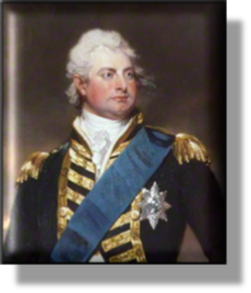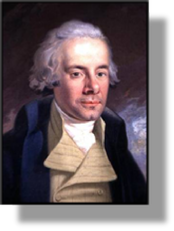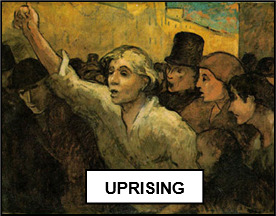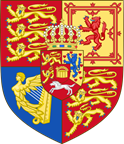


 xxxxxWilliam IV succeeded to the throne of Great Britain and
Ireland (and became king of Hanover) on the death of his brother
George IV. He served in the Royal Navy for some years, joining at
the age of 14 and seeing service under Admiral Nelson. As a
consequence he acquired the nickname of the “Sailor King”. Though
somewhat gruff and vulgar at times, he was a breezy, uncomplicated
character who tended to speak his mind, a trait which won him a
measure of popularity among the general public. He was by no means
as talented and politically astute as his brother George, but he led
a far less dissolute and extravagant life - though he did have
ten children (the FitzClarences) by his mistress, an Irish actress
named Dorothea Jordan! He was made Duke of Clarence in 1789, and
became heir to the throne following the death of his niece Charlotte
in 1817. With this in mind, he married the German princess Adelaide
of Saxe-Meiningen the following year. They had two daughters,
but they both died in infancy.
xxxxxWilliam IV succeeded to the throne of Great Britain and
Ireland (and became king of Hanover) on the death of his brother
George IV. He served in the Royal Navy for some years, joining at
the age of 14 and seeing service under Admiral Nelson. As a
consequence he acquired the nickname of the “Sailor King”. Though
somewhat gruff and vulgar at times, he was a breezy, uncomplicated
character who tended to speak his mind, a trait which won him a
measure of popularity among the general public. He was by no means
as talented and politically astute as his brother George, but he led
a far less dissolute and extravagant life - though he did have
ten children (the FitzClarences) by his mistress, an Irish actress
named Dorothea Jordan! He was made Duke of Clarence in 1789, and
became heir to the throne following the death of his niece Charlotte
in 1817. With this in mind, he married the German princess Adelaide
of Saxe-Meiningen the following year. They had two daughters,
but they both died in infancy.
xxxxxHis reign was peaceful in
the sense that there was no involvement in war, but it was very
troubled nonetheless, due to the widespread political unrest and
social distress which continued unabated in the wake of the
Napoleonic Wars. As we shall see, the first major event of his reign
was the prolonged and difficult passage of the first Reform Bill,
eventually passed in 1832. He was plunged into this crisis very soon
after taking the throne. He possessed very little political
judgement and, initially, tended to oppose any reform measures.
Eventually, however, fearing a nation-wide insurrection, he
played his necessary part in forcing the reactionary Tory party to
accept a slightly watered-down version of the original bill. By
it the franchise was increased and representation in the House of
Commons was more fairly distributed, the first tentative steps
towards a more acceptable parliamentary democracy.
 xxxxxHis reign also saw the passing of some significant
social measures. The Factory Act in 1833, for example, outlawed the
worst abuses of child labour, and the following year, the new Poor
Law introduced the workhouse system in an attempt to meet the needs
of the most deprived members of society. And despite the harsh
punishment meted out to the Tolpuddle Martyrs - perhaps because
of it - the trade union movement began to gather strength. And
after a long and arduous campaign, led in the Commons by William
Wilberforce (illustrated),
1833 saw the abolition of the slave trade in all British
possessions, though its provisos took some years to work through.
xxxxxHis reign also saw the passing of some significant
social measures. The Factory Act in 1833, for example, outlawed the
worst abuses of child labour, and the following year, the new Poor
Law introduced the workhouse system in an attempt to meet the needs
of the most deprived members of society. And despite the harsh
punishment meted out to the Tolpuddle Martyrs - perhaps because
of it - the trade union movement began to gather strength. And
after a long and arduous campaign, led in the Commons by William
Wilberforce (illustrated),
1833 saw the abolition of the slave trade in all British
possessions, though its provisos took some years to work through.
 xxxxxThe political and social unrest which triggered off
these measures of reform, potentially threatening in their own
right, loomed much larger because of events taking place on the
continent during this reign. The July Revolution in France, in which
Charles X was toppled from power in 1830, gave notice to the British
government, as did the rebellions in Poland and Germany,
unsuccessful though they were, that the power of the people was
beginning to be felt, and was to be ignored at a nation’s peril.
This said, the British government remained committed to self-determination.
Lord Palmerston played an important part in securing and
guaranteeing the independence of Belgium once the Belgians had
overthrown their Dutch masters in 1831.
xxxxxThe political and social unrest which triggered off
these measures of reform, potentially threatening in their own
right, loomed much larger because of events taking place on the
continent during this reign. The July Revolution in France, in which
Charles X was toppled from power in 1830, gave notice to the British
government, as did the rebellions in Poland and Germany,
unsuccessful though they were, that the power of the people was
beginning to be felt, and was to be ignored at a nation’s peril.
This said, the British government remained committed to self-determination.
Lord Palmerston played an important part in securing and
guaranteeing the independence of Belgium once the Belgians had
overthrown their Dutch masters in 1831.
xxxxxWilliam IV was the last
British monarch to attempt to dismiss a prime minister (Lord
Melbourne in 1834) and install one of his own choice. To this
dubious claim to fame must be added his inability - despite a
determined effort - to throttle the Reform Bill of 1832 at its
birth. When he died in June 1837, there died with him the last
remnants of autocratic rule by a British monarch. Future kings and
queens were to make their influence felt in the corridors of power,
but never at the expense of parliamentary democracy - although
Queen Victoria came close to it at times!
xxxxxIncidentally,
William’s wife Adelaide was much admired for her modesty and for her
charity work. The city of Adelaide, capital of South Australia, was
named after her.
WILLIAM IV 1830 -
1837 (W4) Lived 1765 - 1837
|
1830
|
The July
Revolution in Paris overthrows Charles X and brings the
more moderate Louis-
Philippe to the throne. This rebellion
sparks off popular revolts across Europe in
1831.
 French
forces invade Algeria in
North Africa to put an end to piracy. They seize the capital,
Algiers, but their conquest of the northern region of the
country is not completed until 1847. French
forces invade Algeria in
North Africa to put an end to piracy. They seize the capital,
Algiers, but their conquest of the northern region of the
country is not completed until 1847.
The French philosopher Auguste Comte, founder of sociology and father
to the concept
of positivism, begins work on his six-volume
treatise, Course de philosophie positive.
The opening of the Liverpool-Manchester
railway line in northern England, the work of the
Scottish engineer George Stephenson, opens
up the Age of the Railway across the world.
|
|
1831
|
The French revolution of July 1830
sparks off popular uprisings across Europe. In Poland,
Germany and Italy they have little or no
success, but Belgium
gains its independence.
Muhammad Ali of Egypt throws off Turkish
rule and conquers Syria, held by the Ottoman
Empire since
1516. However, European powers force him to leave Syria in 1840 (Va).
Having produced the first electric motor,
the English physicist Michael
Faraday outlines
the principle of electromagnetic induction,
and makes the first electric dynamo.
The great French writer Victor Hugo, publishes the first of his well-known
novels, The Hunchback of Notre Dame.
He also makes his name as a talented poet and playwright.
The two Italian opera composers, Vincenzo Bellini and Gaetano
Donizetti, gain fame for their flowing bel
canto melodies, designed to show off the virtuoso
singers of the day.
The Russian writer Aleksandr
Pushkin, the founder of his country’s modern literature,
completes his novel Eugene Onegin,
and publishes his historical drama Boris
Godunov.
  The
English explorer James Clark
Ross, voyaging with his uncle John
Ross, locates the position of the north magnetic pole. He
leads an expedition to Antarctica in 1839. The
English explorer James Clark
Ross, voyaging with his uncle John
Ross, locates the position of the north magnetic pole. He
leads an expedition to Antarctica in 1839.
The English naturalist Charles Darwin leaves
aboard HMS Beagle on a world
surveying expedition. The five-year voyage was to bring
about a revolution in the science of biology.
|
|
1832
|
The First
Reform Act is passed in Britain, extending the franchise
and improving the
distribution of parliamentary seats. A
Factory Act and a new Poor Law follow in 1833/34.
|
|
1833
|
Slavery is abolished throughout the British
Empire, and the American Anti-Slavery Society
is founded. But it was some 40 years before
most European countries had imposed a ban.

Following the death of Ferdinand VII of
Spain, his brother, Don Carlos, attempts but fails to seize the
throne from Ferdinand’s daughter Isabella
in the savage First
Carlist War.
A sermon on the decline of religious faith
in England, preached by the Anglican priest John
Keble, launches the Oxford
Movement, led by the brilliant theologian John Henry
Newman.
The Scottish geologist Charles Lyell completes
his Principles of Geology in which he
supports Hutton’s “uniformitarianism”, and indirectly influences
Darwin’s theory of evolution.
Katsushika
Hokusai finishes his Thirty-six
Views of Mount Fuji. He and his contemporary
Ando
Hiroshige, both exponents of ukiyo-e,
dominate Japanese print making at this time.
The English inventor Charles Babbage, having attempted to build a
mechanical calculator.
in 1823, conceives the idea of a computer,
but his “analytical engine” is never completed.
|
|
1834
|
Six English farm labourers from Dorset -
known as the Tolpuddle
Martyrs - are
transported to Australia for forming a trade
union aimed at securing higher wages.
The brilliant French realist writer Honoré de Balzac writes
Le Père Goriot, a major work in his The Human Comedy, a vast series of some
ninety novels and short stories.
The Spanish Inquisition, instituted in 1478 (E4), is finally abolished by a Royal
decree, signed by regent Maria Christina of the Two Sicilies
during the minority of Isabella II.
|
|
1835
|

The Danish writer Hans
Christian Andersen produces the first of his many fairy
tales, now known the world over. By 1872 he had published 168
stories, many of his own making.
The English pioneer photographer Fox Talbot,
using sensitized paper, makes an image of his house. He and the
Frenchman Louis Daguerre make public this method in 1839
(Va).
|
|
1836
|
In the Texan
War of Independence, the Texans are defeated by the
Mexicans at the siege
of The Alamo and
later at Goliad, but finally win their freedom at the Battle of
San Jacinto.
The Boers of South Africa begin their Great Trek northwards to escape British rule
and
to find new land. They eventually settle in
Natal, Transvaal and the Orange Free State.
Mr Midshipman Easy is
published, one of many adventure stories written by the
English seafarer Frederick
Marryat. He later wrote the classic tale
Children of the New Forest.
|
|
1837
|
The American inventor Samuel Morse produces his electromagnetic
telegraph system, together with a code of signals by which
messages can be sent over vast distances.
 The
first kindergarten is opened in
Blankenburg, Prussia, by the educator Friedrich
Froebel. Designed
to develop a child’s natural ability, the idea is taken up
world-wide. The
first kindergarten is opened in
Blankenburg, Prussia, by the educator Friedrich
Froebel. Designed
to develop a child’s natural ability, the idea is taken up
world-wide.
William IV is taken ill and dies of a heart
condition towards the end of June. Having no children, he is
succeeded by his niece, the young Queen
Victoria.
|
Acknowledgements
William IV:
detail, by the Irish portrait painter Sir Martin Archer Shee
(1769-1850), 1800 – National Portrait Gallery, London. Wilberforce: detail, by the Bohemian Anton Hickel (1745-1798),
c1794 – Wilberforce House, Hull Museum, Yorkshire, England. Uprising: by the French painter Honoré Daumier (1808-1879),
c1860 – the Phillips Collection, Washington. Coat of Arms: licensed under Creative Commons. Author: Sodacan –
https://commons.wikimedia.org.
W4-1830-1837-W4-1830-1837-W4-1830-1837-W4-1830-1837-W4-1830-1837-W4-1830-1837-W4







Timewise Traveller is a free
non-profit resource. However, if you have found it of
interest/value and would like to show your appreciation, the author
would welcome any contribution to Cancer Research UK.
To visit our Cancer Research
page and make a small donation, click 










 xxxxx
xxxxx xxxxx
xxxxx xxxxx
xxxxx French
forces invade
French
forces invade 


 The
first
The
first 